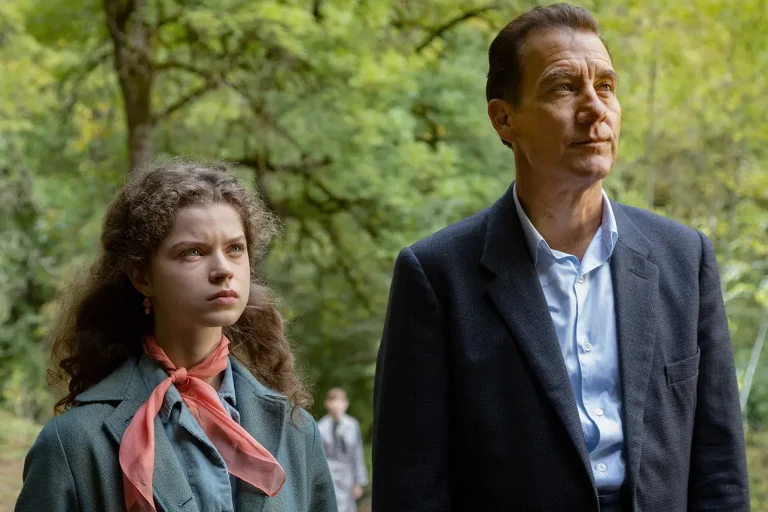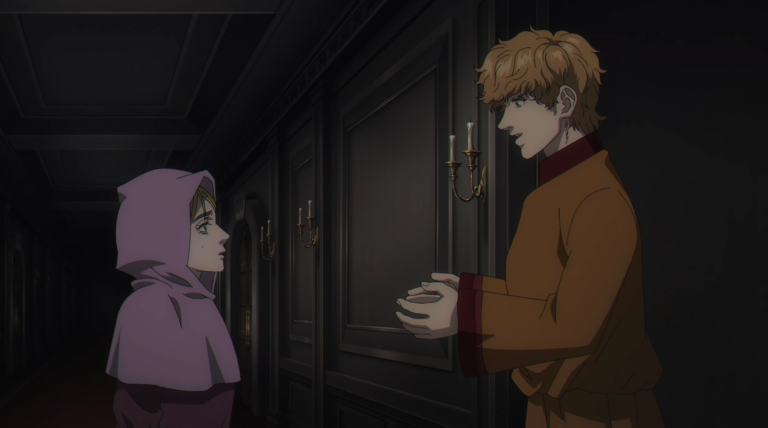Hellraiser (2022) Ending, Explained: In 1987, horror writer Clive Barker decided to take matters into his own hands by creating Hellraiser, a faithful film adaptation of his bestselling novel, The Hellbound Heart. Barker’s Hellraiser opened up fresh avenues for horror with its layered storytelling and sadomasochistic spin on the concepts of pain and pleasure. The introduction of Cenobites, who were extradimensional beings acting as “angels to some…demons to others,” kickstarted a new genre of horror antagonists worth investing into. This, coupled with a cursed puzzle box called the Lament Configuration, helped evoke the darkest caverns of the human mind while making way to a literal realm synonymous with hell.
David Bruckner’s brand of horror can be described as visceral, psychological, and intense. His Night House, which is both a terrifying metaphor for depression and the tale of a woman hounded by grief, stands out due to its mature scares and deft tackling of dense themes. The story’s beats take on a modern turn, tackling age-old human ills, and present a hellish new puzzle whose solution comes at a price. Bruckner’s rendition of Hellraiser, while faithful to Barker’s vision, Bruckner’s arrangement of Hellraiser reinvigorates the franchise in the best of ways, especially after a slew of mostly middling-to-underwhelming sequels that follow the 1987 original.
The ending of Hellraiser (2022) binds together the running themes of the Hulu reboot, which include a cautionary tale about human desire and hubris and how interpretations of boons and curses vary as we stray away from strictly human experiences. Here’s a deep dive into the ending of Bruckner’s Hellraiser.
HELLRAISER (2022) Plot Summary & MOVIE SYNOPSIS:
Hellraiser (2022) opens with a new cycle of otherworldly sights after an innocent man is lured into solving the Lament Configuration by shady millionaire Roland Voight (Goran Visnjic). Those familiar with the weight of the history of the puzzle box immediately understand that this is a calculated sacrifice, as the Lament Configuration claims victims in return for a wish granted to the puzzle box’s owner. The box’s current owner, Voight, watches his mansion’s sky-glass panel darken after the man’s death, and it is interesting to note that his house itself has an operable cage that acts as a Lament Configuration.
Cut to recovering addict Riley (Odessa A’zion), who finds it difficult to start life afresh and get on her own feet. There’s considerable tension between her and her brother Matt (Brandon Flynn), who she lives with, along with two other roommates. Matt’s overbearing nature does not help matters, especially when he expresses concern over her relationship with a fellow recovering addict, Trevor (Drew Starkey). However, Riley decides to continue her relationship with Trevor, and the two decide to steal a cargo box in an abandoned warehouse, where they stumble upon the Lament Configuration. This unleashes literal and metaphorical hell for the characters involved.
HOW DOES THE LAMENT CONFIGURATION WORK IN HELLRAISER [2022]?
The Lament Configuration is a mystical puzzle box that acts as a portal to another realm when solved by the user. This occurs in the original Hellraiser, in which Kirsty Cotton fiddles with the box and accidentally opens a portal to the realm of the Cenobites, which triggers the events of the film’s second half. In Bruckner’s Hellraiser, Riley follows a similar path: she has no idea what the box does and accidentally solves the first part of the puzzle while being high on pills.
The moment it is solved, the box juts out a raised, short section that unfortunately cuts Matt, who happens to be on the scene to make sure Riley is okay. The box claims Matt, and later, Voight’s former right hand, Serena, and this leaves a guilt-stricken Riley investigating the Lament Configuration’s origins on her own. While Riley sees glimpses of the Cenobites, who seem to be wearing their own skin as garments, she has no idea whether they’re real or hallucinations induced by the pills.
After connecting Voight, the last known user of the box, to a string of disappearances, Riley visits his seemingly-abandoned mansion and stumbles upon his diary. There, she learns that the puzzle box has six levels of configurations, dubbed: LIFE, KNOWLEDGE, LOVE, SENSATION, POWER, AND RESURRECTION. Each configuration or level demands a sacrifice. After the user reaches the sixth and final level, they will be granted an audience with Leviathan, the god of flesh, hunger, and desire. This obviously means that if Riley wants to escape a bloody, painful death and an eternity in the Labyrinth, she must choose her next victims and claim her reward in the end.
![Hellraiser [2022] Ending Explained](https://79468c92.delivery.rocketcdn.me/wp-content/uploads/2022/10/Hellraiser-2022-scaled.jpg)
Hellraiser (2022) Movie, Ending Explained:
HOW DOES ROLAND VOIGHT FACTOR INTO THE EVENTS OF THE FILM?
Voight, who is presumed dead or missing, suddenly appears inside his mansion and sacrifices Riley’s roommate Nora (Aoife Hinds) by stabbing her with the blade of the puzzle box. This makes her the third victim, and the Cenobites appear immediately to collect their due. It turns out Voight reached the final level of the Configuration, got his audience with Leviathan, and asked for SENSATION, as he only considered sensation as a portal to pleasure.
Voight’s fate highlights the gross misunderstanding of concepts that mean different things to the Cenobites, as opposed to humans — for them, pleasure and agony are synonymous, and their pain-pleasure threshold is quite different from humans. However, the gifts of the Cenobites are quite literally double-edged swords: Voight was gifted a machine that attached itself to his body and constantly stretched his nerves, which brought him unimaginable agony. Voight fails to factor this into his request and decides to set things into motion again by ensuring that the box ends up in Riley’s hands.
The events of Hellraiser are orchestrated by Voight, who employs Riley’s boyfriend, Trevor, to get close to her and ensure the box reaches her. Perhaps, the millionaire deduced that someone in an emotionally-volatile state like Riley would be an easy target and that this would help him to achieve his goals easily. However, Voight grossly underestimates her, as Riley, although torn between extremes, tries her best to escape her fate and avoid the same doom for her friends. This is evidenced when she stabs the Chatterer with the puzzle’s blade, making him the fourth victim.
PINHEAD MAKES AN OFFER – WHAT WILL RILEY CHOOSE?
The Hell Priest, aka Pinhead (Jamie Clayton), warns Riley that the box marks her. Hence she has to choose between sacrificing herself or others for this to end. Pinhead’s reward is RESURRECTION, which would reunite Riley with her brother, Matt. Riley considers this seriously but does not want to sacrifice her friends to achieve this end. Riley, Trevor, and Matt’s boyfriend, Colin (Adam Faison), concoct a plan to lure the Cenobites inside the house and attempt to kill them instead to reach the final configuration.
By this point, Voight reveals himself, and Trevor’s betrayal is revealed, which urges Riley to negotiate with the Cenobites, who wish to claim Colin. Explaining that she has the right to choose the final sacrifice as the owner of the box, she stabs Trevor, which saves Colin’s life in the process.
Also, Read – 10 Great Horror Movies Of The 1980s
Meanwhile, Voight, who is faced with the Hell Priest, demands a second audience with Leviathan and orders her to remove the machinery, which he rejects as a gift. Pinhead notes that gifts cannot be taken back but exchanged and asks Voight what he would want in exchange. Voight chooses POWER, which temporarily takes away his machinery, but he is soon pulled upwards into the Leviathan craft. By choosing power, Vought inadvertently decides to become a Cenobite, a being who can only feel powerful by inflicting pain on others and himself. The process morphs him beyond recognition, killing any vestige of humanity left in him, and begins a fresh chain of agony and sadistic pleasure.
When it’s Riley’s turn to claim her reward, the Hell Priest reminds her to choose RESURRECTION, as it would reunite her with Matt. However, after witnessing Vought’s fate, Riley understands that these gifts are not meant for humankind and can only manifest more misery and endless suffering. She decides not to choose at all, which defaults to choosing LIFE, or the Lament Configuration, which means that while this era of terror will be over, Riley will always live with regret, guilt, and misgivings. Although the ending is bittersweet, Riley chooses to live her existence on her terms and experience the joys and horrors of life as they come.





![We Had it Coming [2021] Review – A bleak rape-revenge drama that presents a one-dimensional world](https://79468c92.delivery.rocketcdn.me/wp-content/uploads/2021/09/AlexiaFast_NatalieKrill-768x512.jpg)


